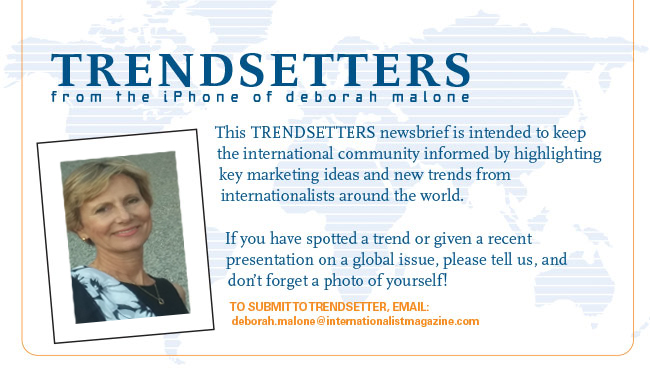

Tom Denford
See the current issue
of The Internationalist magazine
Find out how to sponsor an issue of Trendsetters
|
|
Trendsetters: Tom Denford Demonstrates How Greater Clarity on Rebates Is Key to Trust Between Brands & Media Agencies
Tom Denford is Chief Strategy Officer of the UK-based, independent media management consultancy ID Comms, and the company's recent Transparency Survey found that more than 70% of advertisers and agencies globally believe that the way an agency manages rebates is the most important factor in the level of trust an advertiser has in in its media agency.
The survey is based on responses from 140 advertisers and senior executives at agencies. This includes marketers from brands representing a total, annual global advertising spend of approximately USD $20 billion, while agency respondents came from all six major holding companies, as well as key independent media agencies in the US, UK and Germany. According to Tom Denford, the goal of the study was to show how transparency in its broadest sense, as a business principle, can deliver benefits for both advertisers and their agencies.
He says, "The challenge is that issues like transparency in planning and data are overshadowed by advertisers' concerns about agency business models. Yet, an advertiser that has a strong relationship with their agency, including a transparent and fair payment model, best-practice contractual language that protects their interests, and a clear view of how their budgets are traded by the agency is most likely to build a trusting partnership for the benefit of both parties. This also often results in longer tenure for the agency and an increased willingness to reward them when they deliver business value."
Interestingly, the Transparency Survey showed that US clients were slightly more positive about current levels of media agency trust as 61% described trust levels as "average," 26% as "low," and 13% as "high." By contrast, European marketers were quite negative with 14% describing trust levels as "very low," and 22% as "low."
A significant 81% of US marketer respondents rated "how the agency makes money" as critical to trust. Agency respondents tied "how the agency trades with media vendors" and "how the agency manages rebates/AVBs" as the most influential factors in determining advertiser trust. Both sides acknowledge the importance of establishing a trusted relationship between client and agency with the vast majority (77%) agreeing or strongly agreeing that a close relationship with external marketing agencies will "tend to deliver a stronger marketing performance."
Agencies were more optimistic about the future prospects for the relationship, while also recognizing the challenges facing the business-- 39% expecting things to get worse, compared to 38% who thought trust levels would improve. Among clients, the outlook was more sceptical with just 7% expecting trust to increase "a lot," compared to 15% for agencies. US advertisers were more hesitant than their European counterparts as 17% expected trust in media agencies to reduce "a lot," compared to 11% for European-based executives.
These findings were also discussed among an expert industry panel in London this month, hosted by ID Comms. The panel offered a range of advice on how to rebuild trust-- from greater openness on how holding companies make money to stronger leadership from marketers as they grow their media expertise and manage their relationships with external partners.
Panelist Bob Wootton, ISBA's long-serving director of advertising and media, believes there is a need for cultural change at agencies regarding whose money is being spent and managed, as well as re-establishing the process for getting the right deal.
Iain Jacob, the EMEA CEO for the new Publicis Media, argued that part of the solution was for agencies to be clearer about what business they were in-- commodity or advisory. He said, "You actually have to decide what business are you in and then how you're going to do that. And there's nothing wrong with being in a sales business by the way, it's legitimate, but that's not an advisory business."
The debate wasn't just about agency change. Wootton stressed that marketers were "too vanilla and cheap" when it came to media.
As a result of the Transparency Survey and expert discussion, ID Comms launched The 7Ts, a strategic framework for brands looking to realize competitive advantage in media, by drastically improving their internal capabilities and their relationships with external agencies. This includes techniques to improve Transparency, Technology, Talent, Thinking, Training, Terms and Trading.
The Transparency Survey was conducted between 24th February and 4th March 2016. There were 140 responses in total representing brands with a total, global advertising spend of approximately $20bn. Job functions of respondents included international Marketing, Media and Procurement specialists, with respondents having a mix of global, regional and local responsibilities. Agency respondents came from all six major holding companies as well as key independent media agencies from USA, UK and Germany. Sixty-five per cent of respondents were based in Europe, 25% in the US and 10% in the Rest of World.
ID Comms is a strategic media consulting company, which Tom Denford co-founded in 2009 with David Indo. Acting as trusted advisors to senior marketing and procurement leaders, ID Comms helps navigate the complexities of the changing media landscape.
Prior to founding ID Comms, Tom was Global Head of Communications Planning at media agency Carat and before that worked as Director of Communications Planning at creative agency JWT in New York.
Since founding ID Comms, Tom has focused on innovating the productivity of the client / agency relationship, most notably how media resource is organized, how agencies can work better together, and how resources should be paid for.
Tom holds a degree in Law (LLB) from London University, is a member of the Chartered Institute of Purchasing & Supply (CIPS) an Associate Lecturer for the Marketing Communications Masters MA at the University of Greenwich.
